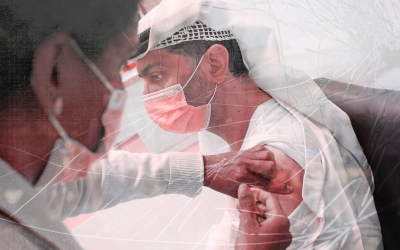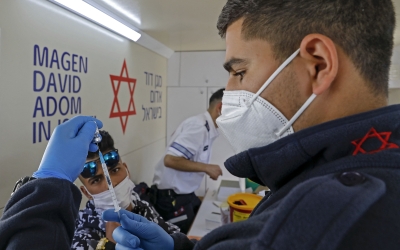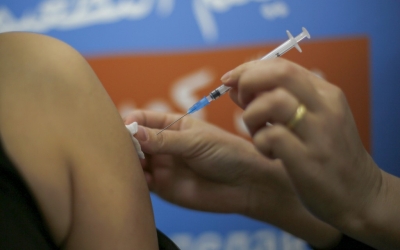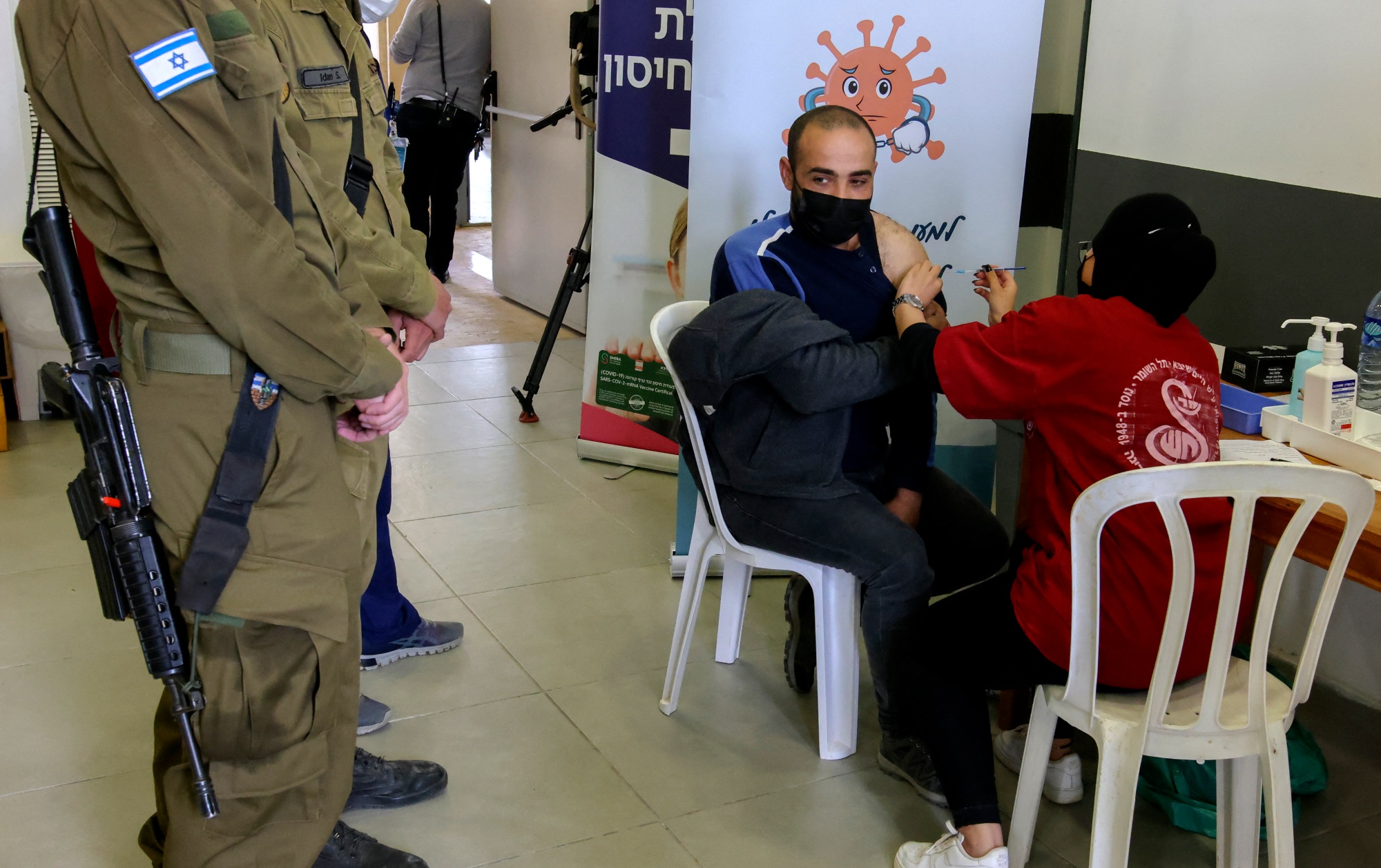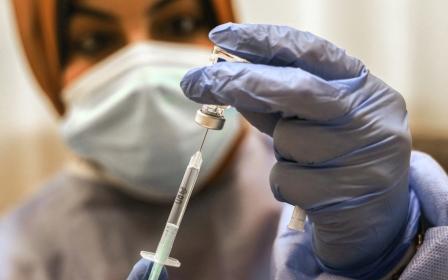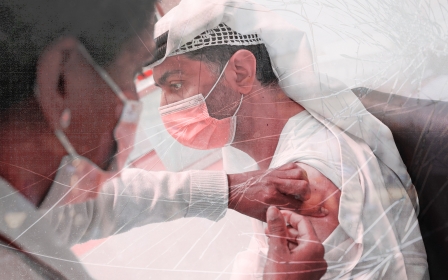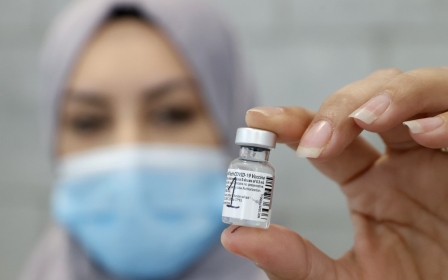Covid-19: West Bank hospitals inundated while Israel tosses surplus vaccines
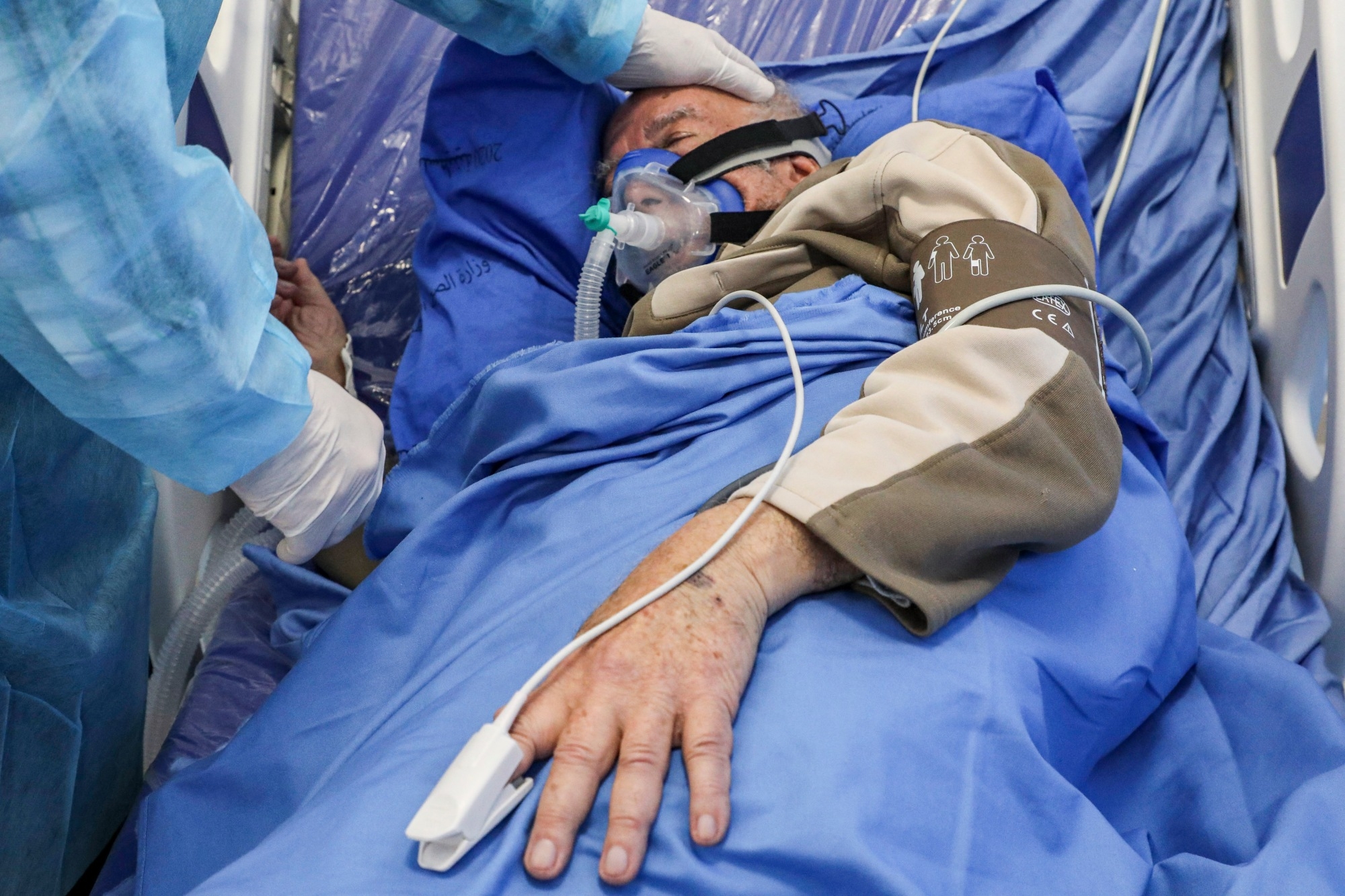
When Issa Saafi rushed his ill mother to the Ramallah government hospital, one of the primary hospitals in the occupied West Bank city, he never anticipated that it would turn into one of his worst nightmares.
Safiya Saafi, 70, had fallen ill with Covid-19-like symptoms at her home in Ramallah’s Jalazone Refugee Camp. At the time, her children didn’t think much of it, as she seemed to be doing okay.
But on 10 March Safiya’s condition took a turn for the worse, and Issa and his brothers rushed her to the hospital. What they found, Issa said, shook him to his core.
“We walked into the hospital and it was like something out of a war zone,” Issa told Middle East Eye. “There were people sleeping in chairs and on mattresses on the floor, and many of them were hooked up to ventilators and oxygen tanks.
“When we got there, the nurses did a Covid-19 test on my mother, and it came back positive,” he said. “As the doctors were evaluating her, they said that she was having a stroke, and that she needed to be admitted urgently.”
But when nurses led Issa, along with his brothers and bedridden mother, through the hospital, they were not taken to the hospital’s Covid-19 unit, ICU, or other patient rooms.
“They took us into this back room, it was like a storage room and washroom combined, with all these boxes and supplies everywhere,” he said, adding that the room was dirty, and looked like it hadn’t been cleaned in a while.
“Then they rolled her in and put her bed in that room. I was in complete shock,” he said.
Issa told MEE that he protested with hospital staff, but was told that “we don’t have anywhere else to put her, this is the only open space we have.”
'On just that first day when I was sitting in the hospital, I saw three people die from Covid-19 in front of me. It was devastating to watch'
- Issa Saafi
Issa said that while he was by his mother’s side, he witnessed just how understaffed the hospital was. “When we were there, we saw about four nurses treating 80 patients. They couldn’t keep up with anyone,” he recalled.
“On just that first day when I was sitting in the hospital, I saw three people die from Covid-19 in front of me,” Issa said. “It was devastating to watch. The hospitals can't keep up. The doctors can't keep up. The doctors kept telling us they are doing their best but they can't do anything more for us.”
According to Issa, his mother was told that there were 14 people on the waiting list in front of her to get into the ICU at the hospital.
“It was like we were being told that they were waiting for people to die so that she could eventually just get a proper bed in the ICU,” he said. “But how much longer would we have to wait for my mum to die before she gets help?”
A video of an emotional Issa speaking to a local Palestinian news station about what happened to his mother went viral on Palestinian social media last week, as people expressed their grievances over the worsening Covid-19 crisis in the West Bank, and the lack of resources in Palestinian hospitals.
Stories like Issa Saafi’s resonated with many Palestinians who shared similar experiences, as thousands of new cases of the coronavirus continue to be reported in the West Bank every day, and more and more hospitals fill up to capacity.
A surplus of Israeli vaccines
By Wednesday, Palestinian Health Minister Mai al-Kaila said that hospitals in the West Bank had exceeded 110 percent capacity, and that the current situation in Palestine was “very dangerous”.
As of Wednesday, the occupied Palestinian territories have recorded nearly 216,000 cases of Covid-19 since the beginning of the pandemic, and 2,343 deaths in a population of around five million.
A World Health Organisation (WHO) report on the pandemic in early March noted a rise of 38 percent in infections and 61 percent in deaths in the West Bank, attributing much of the spike to the surge of new coronavirus variants in the territory.
But as Palestinian hospitals continue to overflow with Covid-19 patients, Palestinian civilians in the West Bank are still waiting for their chance to get vaccinated, as constant delays on the part of the Palestinian Authority (PA) have resulted in a stalled vaccine rollout.
In Israel, which has positioned itself as the world leader in coronavirus vaccination efforts, more than 55 percent of the population have received at least one shot of the vaccine, and more than 46 percent have gotten the full two doses.
Israel was the first country in the world to secure a one-of-a-kind deal with the Pfizer pharmaceutical company in late 2020, in which it agreed to weekly shipments of tens of thousands of doses of the vaccine in exchange for providing medical data on its inoculation campaign to Pfizer.
But with Israel’s vaccine rollout having slowed in recent weeks, reports have surfaced of Israeli authorities having a surplus of vaccines that health officials are struggling to find any use for, resulting in the waste of thousands of vaccine doses every week.
A February report by Israeli newspaper Haaretz revealed that hundreds of doses of the vaccine are thrown in the garbage every day in Israel as a result of Israelis cancelling or not showing up to their designated vaccination appointments.
According to the Israeli Democracy Institute (IDI), the Israeli government has purchased 10 million AstraZeneca vaccines, in addition to eight million Pfizer vaccines and six million Moderna vaccines, enough to vaccinate 12 million people.
“Given the fact that there are about six million people in Israel over the age of 15, the immunisation coverage for the Israeli population is full,” the institute said, adding that in the coming months, surplus vaccines enough for up to six million people were likely to accumulate in Israeli warehouses.
In addition to millions of Israelis, the IDI says that the surplus vaccines would be enough to cover the estimated 2.5 million adult Palestinian residents living in the occupied West Bank and Gaza Strip.
“Moreover, AstraZeneca vaccines do not require special refrigeration and can therefore be transported safely to remote places, isolated villages and refugee camps,” the IDI said.
Despite the clear ability to vaccinate the Palestinians living in the West Bank and Gaza Strip, the IDI said it is likely that the Israeli government “does not intend to assign vaccines to the non-Jewish population in the territories”.
Responsibility under international law
The news that Israel is throwing hundreds of vaccines away while Palestinians continue to become infected with the virus at alarming rates in the West Bank has fuelled more conversations about Israel’s responsibility to vaccinate Palestinians in the occupied territory.
Since it began its vaccination campaign, Israel has been urged on by human rights groups and Palestinian activists, who highlight that Israel has a responsibility under international law to vaccinate the Palestinians living under its occupation in the West Bank and Gaza.
“Israel’s duties under the Fourth Geneva Convention to ensure medical supplies, including to combat the spread of pandemics, are heightened after more than 50 years of occupation with no end in sight,” Human Rights Watch (HRW) said in January.
“These responsibilities, alongside its obligations under international human rights law, include providing vaccines in a nondiscriminatory manner to Palestinians living under its control, using as a benchmark what it provides for its own citizens,” the report said.
Israel’s Minister of Health Yuli Edelstein rebuked in January calls for Israel to expand its vaccination programme to Palestinians as part of its role as an occupying power, saying “Israel’s obligation [is] first and foremost to its citizens".
“It is our interest, not our legal obligation, but it is our interest to make sure that Palestinians get the vaccine, that we don’t have Covid-19 spreading,” he added.
While Israel has argued that the responsibility of vaccination falls on the Palestinian Authority, as per agreements such as the Oslo Accords, HRW said that “the Palestinian authorities’ own obligations to protect the right to health of Palestinians in areas where they manage affairs do not absolve Israel of its responsibilities”.
While reports indicate that some Israeli leaders are toying with the idea of selling the country’s surpluses to the Palestinians, such measures are unlikely to be approved before the Israeli elections next week.
To date, Israel has donated only a few thousand doses of the vaccine to Palestinian frontline health care workers as a “humanitarian” effort, and has embarked on an effort to vaccinate tens of thousands of Palestinian labourers who work in Israel.
“Israel is only vaccinating the Palestinians who benefit the state of Israel, like the day labourers,” Mohammed Abu Srour, a local activist from Bethlehem told MEE. “But they have a responsibility under international law to vaccinate all Palestinians, end of discussion.”
Abu Srour described Israel’s refusal to vaccinate ordinary Palestinian citizens in the West Bank and Gaza as “totally immoral”, saying that it is “just another example of Israeli apartheid”.
'Israel would prefer for Palestinians to continue dying from Covid-19, rather than supply us with the vaccine surpluses which they have'
- Mohammed Abu Srour, activist
“Israel would prefer for Palestinians to continue dying from Covid-19, rather than supply us with the vaccine surpluses which they have,” he said. “At this point, we’re not even asking for them to take away vaccines from Israelis and give them to us. We are asking for their scraps, their leftovers.
“There needs to be more pressure from the international community on Israel to give the vaccine to Palestinians, because people here are dying every day with no solutions,” Abu Srour said. “They [Israel] need to be held accountable for failing to uphold their responsibilities.”
Issa Saafi said that he “had no words” knowing that his mum and thousands of other Palestinian coronavirus patients were possibly on their deathbeds while Israelis on the other side of the illegal separation wall are throwing the vaccines away.
“They got their vaccines and are now living their lives as normal, and just leaving us to die,” Saafi said. “Getting these vaccines is a basic human right. My mother has a right to live.”
Communities stepping up
While many Palestinians like Abu Srour and Saafi emphasise that the primary responsibility to vaccinate Palestinians lies in the hands of Israeli authorities, they don’t believe that the PA should get off scot-free.
“The PA has continued to say that they have taken on the responsibility to vaccinate us, but they have completely failed up until this point,” Abu Srour said. “Until today, the PA hasn't been able to fulfil the needs of their people.”
On Wednesday, reports confirmed that the PA had received some 60,000 doses of the Pfizer and AstraZeneca vaccines after months of delays.
Prior to that, the PA had only recorded receiving some 12,000 doses of the vaccine. While many of those doses were used to vaccinate healthcare workers, it was revealed that a number of the doses went to government ministers and officials, their staff, and friends and family connected to the government elite.
“Rather than giving the vaccines to people like my mother, who are elderly and have pre-existing health issues, the government took it for themselves and their families,” Saafi told MEE. “What makes them better than my mother?
“Our leaders don’t care about their people, they just want to save themselves,” he said.
Abu Srour told MEE that corruption within the PA, coupled with a flailing healthcare system, has caused a huge dent in Palestinians’ ability to fight the coronavirus, leaving many communities to fend for themselves.
'Our leaders don’t care about their people, they just want to save themselves'
- Issa Saafi, son of Covid-19 patient
“We saw the number of Covid-19 cases spiking in our community, at levels that we haven’t seen before throughout this pandemic, and we knew that things were only going to keep getting worse,” said Abu Srour, who works in the popular committee in Bethlehem’s Aida refugee camp.
According to Abu Srour, some Covid-19 patients in the camp were getting critically ill and in need of hospitalisation, but couldn’t find any hospital or clinic to admit them, nor get access to a ventilator.
“We worked with the local Aida Youth Centre to pull donations together and buy two ventilators, and put together a volunteer team of nurses, doctors, and medical students from our community to help treat the camp’s residents who are sick with Covid-19,” he said.
Just a few days after purchasing the ventilators, Abu Srour got a call from a friend, whose parents were extremely ill with coronavirus and were having trouble breathing.
“Our team of volunteers went and hooked them up to the ventilators, and stayed with them for more than four hours, monitoring their situation and administering them medications until they stabilised,” he said.
Since then, the group of volunteers have created dozens of patient files on residents of the camp who have Covid-19, and continue to monitor and treat those who they have deemed to be in moderate to critical condition.
“We by no means have all the money and resources that we need to be doing this work, but we are doing as much as we can,” Abu Srour said, adding that the group has already received dozens of calls from other communities across the West Bank, asking them to share their model.
“We have a duty to protect our communities when our ‘leaders’ and occupiers fail us, and that’s all we are trying to do,” he said. “We just want to get through this pandemic without losing more people than we have to.”
This article is available in French on Middle East Eye French edition.
Middle East Eye delivers independent and unrivalled coverage and analysis of the Middle East, North Africa and beyond. To learn more about republishing this content and the associated fees, please fill out this form. More about MEE can be found here.


